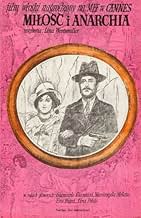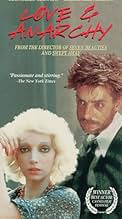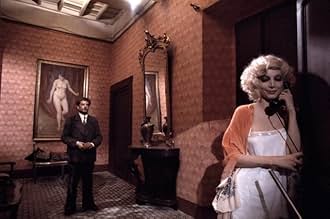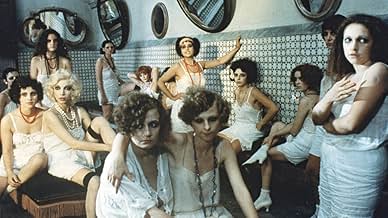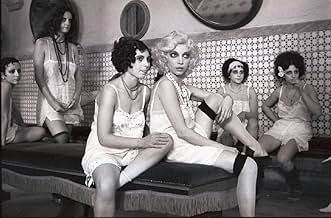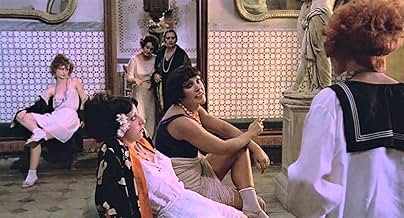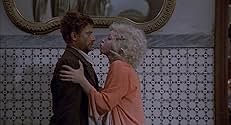Amor e Anarquia
Título original: Film d'amore e d'anarchia, ovvero 'stamattina alle 10 in via dei Fiori nella nota casa di tolleranza...'
AVALIAÇÃO DA IMDb
7,7/10
3,8 mil
SUA AVALIAÇÃO
Quando os fascistas assassinam um amigo, um fazendeiro se instala em um bordel romano, enquanto ele e uma prostituta anarquista conspiram para assassinar Mussolini.Quando os fascistas assassinam um amigo, um fazendeiro se instala em um bordel romano, enquanto ele e uma prostituta anarquista conspiram para assassinar Mussolini.Quando os fascistas assassinam um amigo, um fazendeiro se instala em um bordel romano, enquanto ele e uma prostituta anarquista conspiram para assassinar Mussolini.
- Direção
- Roteirista
- Artistas
- Prêmios
- 4 vitórias e 3 indicações no total
Avaliações em destaque
Directed by Lina Wertmüller in 1973, "Love & Anarchy" is an indisputable classic. Universally identifiable and immediately entertaining, Wertmüller carries her audience into the mind and times of Turin, a peasant in 1930s Italy. When one of his close friends and idols is killed by fascists, Turin becomes obsessed with anarchist ideals he hardly understands, and sets off to exact an awful vendetta--the assassination of Italian dictator Benito Mussolini. The plan gets off-track when Turin falls in love with Tripolina, a prostitute in the bordello where he lives in the days leading up to the assassination attempt. We soon learn that Tripolina returns his love, and the tragic stage is set. Knowing full well that the assassination attempt, successful or not, will surely mean his death, Turin is suddenly gripped by fear. When all he had at stake was a quiet life on the farm, he was glad to give it up for a chance at changing the quality of life for his peasant countrymen. But now, having tasted the happiness love can afford, can Turin really carry through with this suicidal act? Can he truly give up his life for a belief he once thought was worth dying?
"Love & Anarchy" is a brilliant study of turmoil and human testing in the face of insurmountable odds. It begs the question--is it better to bow and live, or stand up and die? How much can a people be crushed before someone makes a sacrifice for the betterment of society? Whose responsibility is it? And on a grander scale, is it better to live happily, contented by love or family, and leave the world untouched, or to attempt real change by sacrificing everything in exchange for it? "Love & Anarchy" poses all these questions, but it offers no easy answers.
Wertmüller's favorite actor, Giancarlo Giannini, plays the peasant boy, Turin, with beautiful humility. He wordlessly portrays infinite subtleties of emotion with body language and facial expression alone. Giannini has the face of a silent movie actor, and in fact was touted as a new Chaplin in the 1970s. Playing opposite him as the prostitute Salome is Mariangela Melato, who viewers may recognize from Wertmüller's "Swept Away." She, too, delivers a wonderful performance. The style and pacing of the film are excellent. Cinematographer Giuseppe Rotunno captures Rome in a gorgeous, yet unobtrusive manner.
In "Love & Anarchy," Wertmüller doesn't pull any punches. As par usual, she lets the politics of her movie decide the fate of its characters, and tragedy ensues. One must admire her for making an extraordinarily brave and beautiful film. She exhibits how powerful and effective a tragic story can truly be in exploring the more complex questions of life.
"Love & Anarchy" is a brilliant study of turmoil and human testing in the face of insurmountable odds. It begs the question--is it better to bow and live, or stand up and die? How much can a people be crushed before someone makes a sacrifice for the betterment of society? Whose responsibility is it? And on a grander scale, is it better to live happily, contented by love or family, and leave the world untouched, or to attempt real change by sacrificing everything in exchange for it? "Love & Anarchy" poses all these questions, but it offers no easy answers.
Wertmüller's favorite actor, Giancarlo Giannini, plays the peasant boy, Turin, with beautiful humility. He wordlessly portrays infinite subtleties of emotion with body language and facial expression alone. Giannini has the face of a silent movie actor, and in fact was touted as a new Chaplin in the 1970s. Playing opposite him as the prostitute Salome is Mariangela Melato, who viewers may recognize from Wertmüller's "Swept Away." She, too, delivers a wonderful performance. The style and pacing of the film are excellent. Cinematographer Giuseppe Rotunno captures Rome in a gorgeous, yet unobtrusive manner.
In "Love & Anarchy," Wertmüller doesn't pull any punches. As par usual, she lets the politics of her movie decide the fate of its characters, and tragedy ensues. One must admire her for making an extraordinarily brave and beautiful film. She exhibits how powerful and effective a tragic story can truly be in exploring the more complex questions of life.
The well-regarded director Wertmuller made this movie which is a slow study into how brutality and violence can be saved my love in my opinion. It is very operatic which is how she chose to attack it. The direction, I can say is flawless but the movie feels incomplete. First, I am more the director who uses visual images rather than hammy stagey dialogue to tell their stories. Carnini is the only actor who does not use a pantomime, overexagerrated style in the movie until the very end, while everybody else does. It softens the impact of the movie as it is the quieter moments that carry real weight. The style of direction is very narchiac with wonderful wide shots and good editing creating an effigy of exuberance over the picture. Most of the picture set in an italian bordello where the fascists of italy stay is a place for both love between carnini and pesilamo. Images are beautiful, and certain individual scenes work while others don't. We are left with a great understanding of what love must feel like but the brutality of man is never explained. It esssentially sets up the theory that all fascists are naturally evil. The ending tells us it is the stoty of one man while the movie sets it up as the story of every man. This the best explanation I can give without speaking too much about its plot. Wertmuller was much better in Swept away and seven beauties. But for an introduction to Wertmuller, and arty Italian cinema of the sixties and seventies which dealt very operaticly with evils of fascism.
10PWNYCNY
Excellent movie. Fast-paced, witty, earthy, entertaining dialog that tells a compelling story. That coupled with excellent acting, great continuity, and an unconventional setting makes this movie a special entertainment event. The movie also dramatizes the life of those on the margins of society and takes the audience on an emotional ride, generously spiced with conflict, arguments, squabbles, reconciliations and above all comradeship and friendship as the story takes a group of otherwise unsavory characters and elevates them to the level of real, but unsung, heroes who, hiding behind their masks of moodiness and bravado, have consciousness and really do care and are willing to act on it. Can a foulmouthed prostitute and a half-deranged peasant be heroes? Is a brothel a legitimate setting for hatching political conspiracies? Are those who society usually despises capable of heroism? This movie is about love and heroism and shows that even the most downtrodden are capable of great acts of personal selflessness. Great movie.
I saw this movie in the 1980s but it remains an all time favourite. It is a terrific story with a range of characters who demonstrate extremes of character. The women are sexy and smart and they are critical to the story. The music by Nino Rota is wonderful and delicately placed within the story. There are many memorable scenes. The stars Giancarlo Giannini, Mariangela Melato, and Lina Polito are perfect for their roles and there are many other notables including Eros Pagni who is the brute given charge of the black shirts. I've watched this film at least a dozen times and I plan to watch it many more before I return to the earth. I commend Love and Anarchy to you.
To live like a dog or to die like a dog? It is an elemental question hovering above the head of a disaffected but weak-minded farmer Tunin (Giannini), after his anarchist friend being murdered by fascist police, he decisively joins the anarchist camp, and takes up his dead friend's cause, to kill Benito Mussolini. He arrives in Rome, and contacts his comrade Salomè (Melato), a premier prostitute in a brothel, who will assist to carry out his assassin plan. During a location scout with the unsuspecting Spatoletti (Pagni), the head of Mussolini's police division, Tunin falls for a young working girl Tripolina (Polito), will the mutually spontaneous romance spoil Tunin's determination of his action? Or, does it matter?
LOVE AND ANARCHY is Wertmüller's seventh feature, which debuted in Cannes in competition and won Giannini BEST ACTOR award. It is the second teamwork for Wertmüller, Giannini and Mariangela Melato, after THE SEDUCTION OF MIMI (1972), and they would try a third time in SWEPT AWAY (1974) one year later.
Freckle-faced, disheveled, Tunin is an honest but slow-witted countryside man, hasn't been to seaside before, he is not even a radical anarchist, but avenging the death of his friend, is the only thing he knows that can prove his worth, whether or not it is a suicidal mission. Fear is something he has to battle everyday, Giannini registers a viscerally soul-pulverising performance as Tunin, downplays his masculine charm and portrays him as a sympathetic, the salt of the earth sort, a cog in the machine, but radiates with those attributes what make human human. Mariangela Melato's Salomé, a spitfire driven by her own scores against the repressing government, is also superbly thrilling to behold, her piercing look, gravelly voice, worldly-wise flamboyance, and her unabashed camaraderie and affection towards Tunin, leaves a searing impact afterwards. A then 19-year-old Polito, a debutante in her full-fledged flapper outfit, thrusts herself into a more rational attempt to save her lover, only to no avail.
Wertmüller's resplendent depiction of the Italian brothel is certainly inspired by aesthetics of Fellini school, and her taste for music is admirably impeccable as well, whether it is classical pieces like Debussy's CLAIRE DE LUNE, or the catchy French ditty LA PETITE TONKINOISE by Vincent Scotto, together with Nino Rota's sentimentally melodious score, emotionality and vivacity are eternally among the national spirits running in the Mediterranean blood of Italian people, not even the ominous subject matter and demoralising situation can change its tonality.
Less heralded than Wermüller and Giannini's most acclaimed collaboration SEVEN BEAUTIES (1975), which earned both Oscar nominations (yes, Wermüller is the first woman who has even been nominated for BEST DIRECTOR), LOVE AND ANARCHY is no less a fine-crafted equivalent which speaks loud about its filmmakers' political slant and an outstanding melodrama can transfix its audience without compromising its thematic tragic.
LOVE AND ANARCHY is Wertmüller's seventh feature, which debuted in Cannes in competition and won Giannini BEST ACTOR award. It is the second teamwork for Wertmüller, Giannini and Mariangela Melato, after THE SEDUCTION OF MIMI (1972), and they would try a third time in SWEPT AWAY (1974) one year later.
Freckle-faced, disheveled, Tunin is an honest but slow-witted countryside man, hasn't been to seaside before, he is not even a radical anarchist, but avenging the death of his friend, is the only thing he knows that can prove his worth, whether or not it is a suicidal mission. Fear is something he has to battle everyday, Giannini registers a viscerally soul-pulverising performance as Tunin, downplays his masculine charm and portrays him as a sympathetic, the salt of the earth sort, a cog in the machine, but radiates with those attributes what make human human. Mariangela Melato's Salomé, a spitfire driven by her own scores against the repressing government, is also superbly thrilling to behold, her piercing look, gravelly voice, worldly-wise flamboyance, and her unabashed camaraderie and affection towards Tunin, leaves a searing impact afterwards. A then 19-year-old Polito, a debutante in her full-fledged flapper outfit, thrusts herself into a more rational attempt to save her lover, only to no avail.
Wertmüller's resplendent depiction of the Italian brothel is certainly inspired by aesthetics of Fellini school, and her taste for music is admirably impeccable as well, whether it is classical pieces like Debussy's CLAIRE DE LUNE, or the catchy French ditty LA PETITE TONKINOISE by Vincent Scotto, together with Nino Rota's sentimentally melodious score, emotionality and vivacity are eternally among the national spirits running in the Mediterranean blood of Italian people, not even the ominous subject matter and demoralising situation can change its tonality.
Less heralded than Wermüller and Giannini's most acclaimed collaboration SEVEN BEAUTIES (1975), which earned both Oscar nominations (yes, Wermüller is the first woman who has even been nominated for BEST DIRECTOR), LOVE AND ANARCHY is no less a fine-crafted equivalent which speaks loud about its filmmakers' political slant and an outstanding melodrama can transfix its audience without compromising its thematic tragic.
Você sabia?
- CuriosidadesErrico Malatesta, who is quoted at the end of the film, was an Italian anarchist propagandist and revolutionary socialist. He edited several radical newspapers and spent much of his life exiled and imprisoned, having been jailed and expelled from Italy, England, France, and Switzerland. After World War I, he returned to Italy where his Umanità Nova, an anarchist newspaper, had some popularity before its closure under the rise of Mussolini. Malatesta was a committed revolutionary. He believed that the anarchist revolution was inevitable and that violence would be a necessary part of it since the state rested ultimately on violent coercion.
- Cenas durante ou pós-créditosBefore end credits: "I wish to repeat my horror that attacks, which besides being bad in and of themselves are also stupid, because they harm the very cause they are trying to serve...But those assassins are also saints and heroes...And they will be celebrated once the brutal facts are forgotten, and all that is remembered is the idea that inspired them and the martyrdom that made them saints.--Errico Malatesta."
- Versões alternativasFor the initial American release, editor Fima Noveck created a prologue which featured a montage of photos of Mussolini, along with a crawl explaining his rise to power and the violent activities sanctioned in his name during his reign.
- ConexõesFeatured in Dietro gli occhiali bianchi (2015)
Principais escolhas
Faça login para avaliar e ver a lista de recomendações personalizadas
- How long is Love & Anarchy?Fornecido pela Alexa
Detalhes
- Data de lançamento
- Países de origem
- Idioma
- Também conhecido como
- Love & Anarchy
- Locações de filme
- Parrocchia Santissima Annunziata, Piazza Reg. Margherita, 6, 04016 Sabaudia LT, Itália(Tunin cases the outside of the church)
- Empresas de produção
- Consulte mais créditos da empresa na IMDbPro
Bilheteria
- Faturamento bruto mundial
- US$ 965
- Tempo de duração
- 2 h 4 min(124 min)
- Mixagem de som
- Proporção
- 1.85 : 1
Contribua para esta página
Sugerir uma alteração ou adicionar conteúdo ausente


